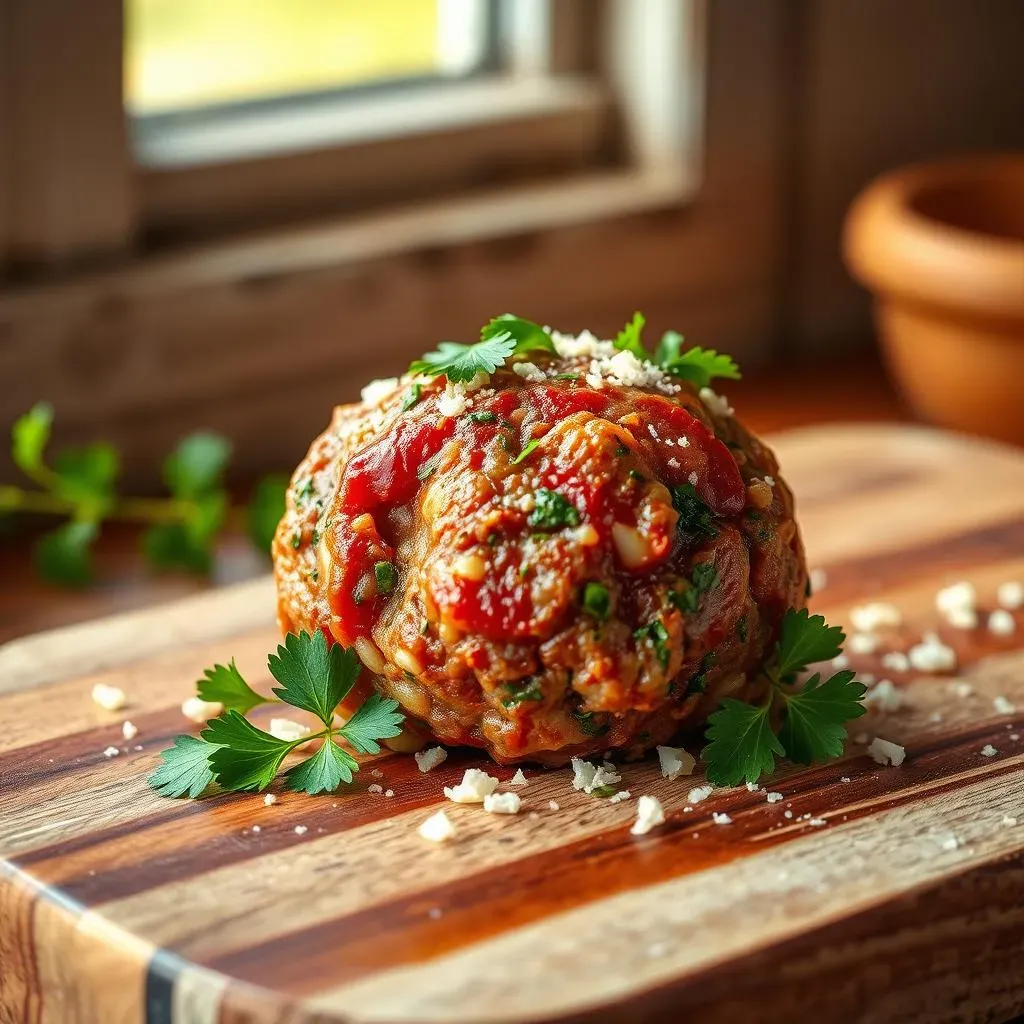Table of Contents
Are you ready to unlock the secrets to crafting mouthwatering meatballs? This comprehensive guide dives into the world of "meatball recipe from ground beef," providing everything you need to become a meatball master. We'll start by exploring the fundamentals: creating the perfect base for your meatballs using ground beef, ensuring they're juicy, flavorful, and perfectly textured. Then, get ready to unleash your creativity! We'll explore exciting variations on the classic meatball recipe, from spicy kick to herbaceous delights, showcasing how simple ingredient swaps can dramatically alter the final product. Finally, we'll arm you with essential tips and tricks—from achieving that perfect browning to preventing dry meatballs—guaranteeing success every time. Whether you're a seasoned chef or a kitchen novice, this guide will equip you with the knowledge and confidence to make unforgettable ground beef meatballs. Let's get started on your meatball journey!
Mastering the Perfect Meatball Recipe from Ground Beef

Mastering the Perfect Meatball Recipe from Ground Beef
The Ground Beef: Your Foundation
Let's talk ground beef! The quality of your ground beef directly impacts the flavor and texture of your meatballs. Aim for a blend that's around 80% lean; this provides enough fat for juicy meatballs without making them greasy. You can experiment with different blends – perhaps adding some ground pork for extra richness, as suggested in this sausage and beef meatball recipe. But remember, the star of the show is your ground beef. Don't skimp on quality!
Properly prepping your ground beef is key. Gently mix your ingredients – overmixing leads to tough meatballs. Think of it like kneading bread: too much handling, and you end up with a tough loaf. A light touch is your friend here. We want to combine everything just enough to ensure that all the ingredients are well incorporated and the mixture is cohesive.
Ground Beef Type | Fat Content (%) | Meatball Result |
|---|---|---|
80% Lean | 20% Fat | Juicy and flavorful |
90% Lean | 10% Fat | Leaner, but potentially drier |
70% Lean | 30% Fat | Very juicy, but could be greasy |
The Art of the Meatball Mix
Beyond the ground beef, the success of your meatballs hinges on the supporting cast of characters: the binder (usually an egg), breadcrumbs for texture, aromatics like garlic and onion for flavor, and seasonings to add depth. Check out this best meatball recipe with ground beef for inspiration.
Don't underestimate the power of fresh herbs! A sprinkle of parsley, oregano, or basil can elevate your meatballs from ordinary to extraordinary. Think of herbs as the secret weapon in your meatball arsenal. They add an unexpected burst of freshness and complexity that'll have everyone asking for your recipe. Experiment and find your signature herb blend!
- 1 large egg (binder)
- ½ cup breadcrumbs (texture)
- 2 cloves garlic, minced (aroma)
- ½ small onion, finely chopped (aroma)
- Salt and pepper to taste (seasoning)
- Optional: Fresh herbs (parsley, oregano, basil)
Exploring Variations: Beyond Basic Ground Beef Meatball Recipes

Exploring Variations: Beyond Basic Ground Beef Meatball Recipes
Spice It Up: Adventurous Meatball Flavors
Let's move beyond the classic Italian meatball! Think spicy Mexican meatballs with chipotle peppers and cumin, or zesty Greek meatballs with feta cheese and oregano. For a real flavor adventure, try adding a touch of harissa paste for a North African twist. The possibilities are endless! You can even explore global flavors by incorporating ingredients from different cuisines. Want some ideas? Check out this beef meatball recipe ideas page for some inspiration.
Don't be afraid to experiment with different spices and herbs. A little goes a long way, so start with small amounts and adjust to your taste. Remember, the goal is to create a balanced flavor profile that complements the richness of the ground beef. A well-seasoned meatball is a happy meatball!
- Chipotle peppers in adobo sauce (Mexican)
- Harissa paste (North African)
- Feta cheese and oregano (Greek)
- Ginger and soy sauce (Asian)
Meatball Makeovers: Beyond the Classic Shape
Who says meatballs have to be round? Get creative with your shapes! Try making meatball sliders using smaller meatballs, or create large, oblong meatballs for a show-stopping presentation. For a fun twist, try making mini meatballs for appetizers or skewers. These beef meatball sliders are a great example of how to change up the presentation.
Consider stuffing your meatballs! Cheese-stuffed meatballs are always a crowd-pleaser. Experiment with different cheeses, like mozzarella, cheddar, or pepper jack. This simple change can add a delightful surprise to your meatballs. You can also add other ingredients, such as chopped vegetables or herbs.
Meatball Shape | Serving Suggestion |
|---|---|
Mini Meatballs | Appetizers, cocktail snacks |
Slider-Sized Meatballs | Meatball subs, sliders |
Large, Oblong Meatballs | Main course, elegant presentation |
Stuffed Meatballs | Surprise flavor, fun texture |
Tips and Tricks for the Best Meatball Recipe from Ground Beef

Tips and Tricks for the Best Meatball Recipe from Ground Beef
Don't Overmix!
Gentle handling is key! Overmixing makes your meatballs tough and rubbery. Think of it like this: you wouldn't overknead bread dough, right? The same principle applies here. Just mix until the ingredients are combined. You want a cohesive mixture, not a workout for your arm.
For perfectly sized meatballs, use a cookie scoop or a spoon. Consistent sizing ensures even cooking. This is a game changer, trust me! No more guessing game with unevenly cooked meatballs. Everyone gets a perfectly cooked bite.
- Use a cookie scoop for consistent size.
- Gently mix ingredients until just combined.
- Avoid overworking the meat mixture.
Cooking Methods: Oven vs. Pan-Frying
Oven-baking yields juicy, tender meatballs, perfect for a hands-off approach. For a crispier exterior, pan-fry your meatballs in a little olive oil. Both methods work great; it just depends on your preference and the desired texture. Check out this beef meatball recipe secrets for more details.
Regardless of your cooking method, make sure your meatballs are fully cooked through. Use a meat thermometer to ensure they reach an internal temperature of 160°F (71°C). This is crucial for food safety and ensures that your meatballs are both safe and delicious. No one wants a raw meatball surprise!
Cooking Method | Pros | Cons |
|---|---|---|
Oven Baking | Easy, less mess, even cooking | May not be as crispy |
Pan-Frying | Crispy exterior, flavorful browning | Requires more attention, potential for uneven cooking |
Sauce It Up!
Don't forget the sauce! A delicious sauce complements your meatballs perfectly. Classic marinara is always a winner, but don't be afraid to experiment with creamy sauces, spicy sauces, or even a simple tomato-basil reduction. The sauce is the finishing touch that elevates your meatballs to the next level.
Simmering your meatballs in sauce after cooking adds extra flavor and moisture. This slow cooking process allows the flavors to meld together beautifully. It's an easy step that makes a big difference. For some inspiration, you could check out these beef meatball spaghetti recipes.
- Marinara sauce
- Creamy tomato sauce
- Spicy arrabiata sauce
- Pesto sauce
Freezing for Future Feasts
Make a double batch and freeze the leftovers! Cooked meatballs freeze beautifully. Simply let them cool completely, then store them in a freezer-safe bag or container. They'll be ready for a quick and easy meal whenever you need them. This is a great time-saver when you're short on time.
To reheat frozen meatballs, you can either thaw them in the refrigerator overnight and then gently reheat them in the sauce, or add them directly to your sauce while it's simmering. Avoid microwaving as it can make the meatballs dry.